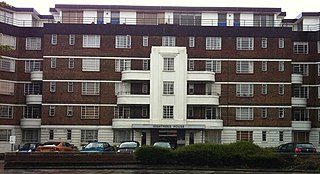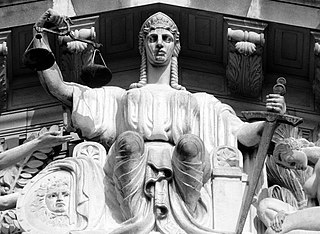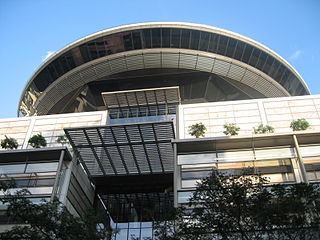Related Research Articles

In English law, natural justice is technical terminology for the rule against bias and the right to a fair hearing. While the term natural justice is often retained as a general concept, it has largely been replaced and extended by the general "duty to act fairly".

Central London Property Trust Ltd v High Trees House Ltd [1947] KB 130 is a famous English contract law decision in the High Court. It reaffirmed and extended the doctrine of promissory estoppel in contract law in England and Wales. However, the most significant part of the judgment is obiter dicta as it relates to hypothetical facts; that is, the landlord did not seek repayment of the full wartime rent.
Obiter dictum is a Latin phrase meaning "other things said", that is, a remark in a legal opinion that is "said in passing" by any judge or arbitrator. It is a concept derived from English common law, whereby a judgment comprises only two elements: ratio decidendi and obiter dicta. For the purposes of judicial precedent, ratio decidendi is binding, whereas obiter dicta are persuasive only.

Estoppel in English law is a doctrine that may be used in certain situations to prevent a person from relying upon certain rights, or upon a set of facts which is different from an earlier set of facts.
R v Sussex Justices, ex parte McCarthy is a leading English case on the impartiality and recusal of judges. It is famous as a legal precedent in establishing the principle that the mere appearance of bias is sufficient to overturn a judicial decision. It also brought into common parlance the oft-quoted aphorism "Not only must Justice be done; it must also be seen to be done."
Judicial review is a part of UK constitutional law that enables people to challenge the exercise of power, usually by a public body. A person who contends that an exercise of power is unlawful may apply to the Administrative Court for a decision. If the court finds the decision unlawful it may have it set aside (quashed) and possibly award damages. A court may impose an injunction upon the public body.
The Canadian Forces Drug Control Program is a series of regulations established in 1992 to prevent drug use among members of the Canadian Forces (CF), under the broad regulation-making auspices of section 12 of the National Defence Act (NDA). It prohibits CF members from involvement with most drugs, except alcohol and tobacco, purportedly to maintain discipline within the CF, ensure the safety, reliability or health of CF members. Chapter 20 of Queen's Regulations and Orders contains several schemes for drug-testing such as safety-sensitive testing, blind testing, and testing for suspicion under the article for "testing for cause." The regulation enforces administrative and disciplinary action against those who transgress its requirements.

United Kingdom administrative law is part of UK constitutional law that is designed through judicial review to hold executive power and public bodies accountable under the law. A person can apply to the High Court to challenge a public body's decision if they have a "sufficient interest", within three months of the grounds of the cause of action becoming known. By contrast, claims against public bodies in tort or contract are usually limited by the Limitation Act 1980 to a period of 6 years.
Canon Kabushiki Kaisha v Green Cartridge Co Ltd is a 1997 decision of the Judicial Committee of the Privy Council (1) re-affirming the principle of UK copyright law that the copying of functional three-dimensional objects is an infringing reproduction of the drawings of the objects, and (2) limiting the doctrine of non-derogation from grants as to chattels to "the case in which the unfairness to the customer and the anticompetitive nature of the monopoly is as plain and obvious as it appeared to the House of Lords in the British Leyland case."

Lloyds Bank Ltd v Bundy[1974] EWCA 8 is a landmark case in English contract law, on undue influence. It is remarkable for the judgment of Lord Denning MR who advanced that English law should adopt the approach developing in some American jurisdictions that all impairments of autonomy could be collected under a single principle of "inequality of bargaining power."

Bias is one of the grounds of judicial review in Singapore administrative law which a person can rely upon to challenge the judgment of a court or tribunal, or a public authority's action or decision. There are three forms of bias, namely, actual, imputed and apparent bias.

Administrative law in Singapore is a branch of public law that is concerned with the control of governmental powers as exercised through its various administrative agencies. Administrative law requires administrators – ministers, civil servants and public authorities – to act fairly, reasonably and in accordance with the law. Singapore administrative law is largely based on English administrative law, which the nation inherited at independence in 1965.

Errington v Wood[1951] EWCA Civ 2 is an English contract law and English land law judicial decision of the Court of Appeal concerning agreement and the right to specific performance of an assurance that is relied on.

English land law is the law of real property in England and Wales. Because of its heavy historical and social significance, land is usually seen as the most important part of English property law. Ownership of land has its roots in the feudal system established by William the Conqueror after 1066, and with a gradually diminishing aristocratic presence, now sees a large number of owners playing in an active market for real estate.

Highway Properties Ltd v Kelly, Douglas and Co Ltd is a leading Canadian property law case concerning commercial landlord-tenant relationships decided by the Supreme Court of Canada.

Procedural impropriety in Singapore administrative law is one of the three broad categories of judicial review, the other two being illegality and irrationality. A public authority commits procedural impropriety if it fails to properly observe either statutory procedural requirements, or common law rules of natural justice and fairness.

Re Shankar Alan s/o Anant Kulkarni was a 2006 administrative law judgment in which the High Court of Singapore quashed a decision made by the Disciplinary Committee of the Law Society of Singapore against a lawyer, Alan Shankar s/o Anant Kulkarni. The Disciplinary Committee had found Shankar, who was a solicitor, guilty of grossly improper misconduct under the Legal Profession Act. Shankar applied to the High Court for judicial review on the ground that the Committee's ruling was affected by apparent bias.

HM Treasury v Ahmed [2010] UKSC 2 is a UK constitutional law and human rights case concerning the United Nations Act 1946 and the powers it grants to the executive to issue terrorism control orders.

VTB Capital plc v Nutritek International Corp[2013] UKSC 5, [2013] 2 AC 337 is an English company law case, concerning piercing the corporate veil for fraud.

Bank of Ireland v O'Donnell & ors[2015] IESC 90 is an Irish Supreme Court case that centred around whether the appellants had any right or capacity to bring a motion before the court. They wanted to seek an order of a stay on Mr Justice McGovern's order dated 24 July 2014. In their appeal, they referred to the principle of objective bias and Mr Justice McGovern's refusal to recuse himself. The Supreme Court rejected the application for a stay and held that the law regarding objective bias was clearly stated in the lower court.
References
- ↑ [1968] EWCA Civ 5 "Metropolitan Properties Co (FGC) Ltd v Lannon[1968]".